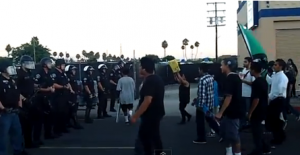Cops Clash With Latino Community After Two Police Shootings
 By Tony Castro, Voxxi
By Tony Castro, Voxxi
In recent days, near riots over two police shootings have catapulted this city into the national spotlight of ethnic-racial unease—a situation complicated by victims with criminal backgrounds, sketchy witnesses and questionable law enforcement actions.
Last Saturday afternoon, Manuel Diaz, a 25-year-old gang member with a criminal record who was apparently unarmed, was shot and killed by police chasing him in an alley in a largely Latino, working-class neighborhood.
“He was shot first in the back, but he was down,” a grief-stricken and teary-eyed Genevieve Huizar told NBC Los Angeles about her son. “Then they shot him a second time. They shot him in the head.”
Anaheim Police Chief John Welter said he can’t say why police shot Diaz during the chase.
“At this time, there’s no information that he was armed when he was shot,” Welter told VOXXI and other news outlets. “But we don’t know what was thrown away as he was running away from the officers, and that was not found.”
Authorities believe that Diaz may have discarded drugs as he fled.
Diaz’s death Saturday led to several nights of rock and bottle-throwing, protestors lighting dumpsters on fire and an attempt by demonstrators to storm a news conference at police headquarters. But even as authorities urged residents to remain calm over the police shooting death, the already volatile tension spiked even higher.
On Sunday night, police shot and killed another suspected Hispanic gang member while pursuing a stolen sport utility vehicle. When three people jumped and fled from the SUV, one of them reportedly fired at police.
An officer shot back, killing the gunman, 21-year-old Joel Mathew Acevedo.
“Are Anaheim police really protecting our communities? They’re not protecting our communities,” said Yesenia Rojas of Orange County, an apparent demonstrator who was struck by rubber pellets during the melee. “They’re killing our kids.”
On the latest night of unrest, 24 were arrested Tuesday during clashes with police that involved about 500 protesters and 250 officers, according to reports.
The FBI is looking into whether a civil-rights investigation is needed, and city officials have called on the U.S. attorney’s office and the state Attorney General to investigate the matter. As standard practice, the officers involved in the shootings have been placed on administrative leave pending the outcome of the investigation.
According to reports, Diaz’ family sued the city and the Police Department on Tuesday, seeking $50 million in damages.
Both officer-related shootings are being investigated by the Orange County district attorney’s office.
Activists say police have become too eager to shoot and point to the six officer-involved shootings in Anaheim this year, up from four a year before, as evidence of that. Five of the shootings this year have been fatal.
“It concerns me when we have any officer-involved shooting,” said police Chief Welter, blaming the increase on the rise in gang-related crime in the last eight to 10 months.
“There just seems to be a lot more violence between the gangs,” said Welter. “As a result, we’ve increased our gang unit, which has increased our contact with gang members.”
According to online court records, Diaz was convicted last year of drug possession. Three years earlier, he was convicted of possessing a firearm on school grounds and being a member of a criminal street gang.
Meanwhile, the protesters have become as much of an issue as the police shootings, with some community members outraged at the looting and damage to storefronts and other private property caused by the demonstrators.
“There’s no reason for the public to be acting like this,” said George Rangel, complaining to reporters about the protesters. “It’s out of control. What we need is leadership within the Mexican community to lead these people.”
This article was first published in Voxxi.
Los Angeles-based writer Tony Castro is the author of the critically-acclaimed “Chicano Power: The Emergence of Mexican America” (E. P. Dutton, 1974) and the best-selling “Mickey Mantle: America’s Prodigal Son” (Brassey’s, 2002). His rite of passage memoir, “The Prince of South Waco: Images and Illusions of a Youth,” will be published in 2013
[Photo screengrab from video by imGabesss]
